Paleobiota of the Yixian Formation

| Part of a series on |
| Paleontology |
|---|
 |
|
Paleontology Portal Category |
The Yixian Formation (simplified Chinese: 义县组; traditional Chinese: 義縣組; pinyin: Yìxiàn zǔ) is a geological formation in Jinzhou, Liaoning, People's Republic of China, that spans about 1.6 million years during the early Cretaceous period (Barremian-Aptian stage). It is known for its fossils, listed below.
The Yixian Formation is divided into the following subunits: (ages from Zhong et al., 2021[1] unless otherwise noted)
- Upper Yixian (124.1 Ma) ("Jingangshan Bed") ("Dawangzhangzi Bed")
- Upper Lava Unit
- Jianshangou Unit (125.46 Ma)
- Lower Lava Unit
- Lujiatun Unit (125.76–125.68 Ma)
Sauropods
[edit]| Genus | Species | County | Member | Material | Notes | Images |
|---|---|---|---|---|---|---|
|
D. dongi |
Beipiao | Jianshangou Bed |
Partial postcrania[2] |
A basal titanosauriform |
 | |
|
cf. Euhelopus |
cf. E. sp. |
Lujiatun Bed |
A basal titanosauriform | |||
|
L. sinensis |
nearly complete skeleton[5] |
A basal titanosauriform | ||||
| Ruixinia | R. zhangi | Beipiao | A partial articulated skeleton[6] | A somphospondylan titanosauriform | ||
|
Sauropoda spp. |
Lujiatun & Jianshangou Beds |
One or more species of sauropods, possibly titanosaurs, have been recovered from the Yixian Formation, though most remain undescribed[3] |
Ornithischians
[edit]The dinosaurs listed below were compiled in a survey by Xu and Norell in 2006, unless otherwise noted.[7]
Ankylosaurs
[edit]| Genus | Species | County | Member | Material | Notes | Images |
|---|---|---|---|---|---|---|
|
L. paradoxus |
Yixian |
Dawangzhangzi Bed |
"Partial skull [and] skeleton."[8] |
A small ankylosaur | 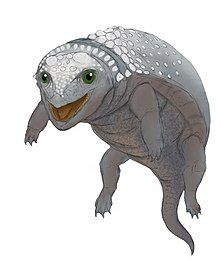 |
Ceratopsians
[edit]| Genus | Species | County | Member | Material | Notes | Images |
|---|---|---|---|---|---|---|
|
L. yanzigouensis |
Beipiao |
Lujiatun Bed |
"[Two] nearly complete skulls, juvenile to adult."[9] |
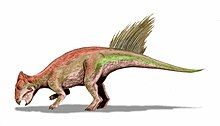  | ||
|
Beipiao |
Lujiatun & Jianshangou Beds |
Thousands of specimens in the Lujiatun Bed, somewhat less common in the Jianshangou Bed |
A ceratopsian |
Ornithopods
[edit]| Genus | Species | County | Member | Material | Notes | Images |
|---|---|---|---|---|---|---|
|
B. yixianensis |
Jianshangou Bed |
A nearly complete skeleton. |
   | |||
| Changmiania[10] | C. liaoningensis | Lujiatun Bed | Two nearly complete skeletons | A basal ornithopod that may have dug burrows | ||
|
J. shangyuanensis |
Lujiatun Bed |
"Skull with associated vertebrae and hindlimb, skull with cervical vertebrae."[11] |
An ornithopod | |||
|
J. yangi |
Yixian |
Dawangzhangzi Bed |
"Nearly complete skull and skeleton."[12] |
An ornithopod |
Theropods
[edit]The dinosaurs listed below were compiled in a survey by Xu and Norell in 2006, unless otherwise noted.[7]
Avialans
[edit]Color key
|
Notes Uncertain or tentative taxa are in small text; |
| Genus | Species | County | Member | Material | Notes | Images |
|---|---|---|---|---|---|---|
| Abitusavis[13] | A. lii | Ningcheng | "Nearly complete skeleton."[13] |   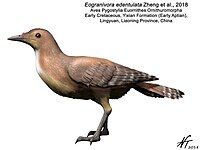  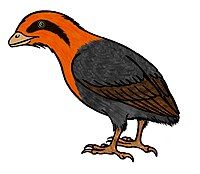 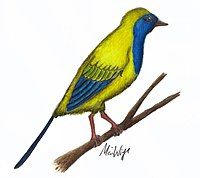 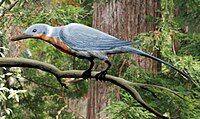  | ||
|
A. spathula |
Dawangzhangzi Bed |
An early, advanced short-tailed bird (ornithuran)[14] | ||||
|
C. hengdaoziensis[15] |
Jianshangou Bed |
"Nearly complete skeleton."[15] |
||||
|
C. chuonzhous |
Junior synonym of Confuciusornis sanctus[16] | |||||
|
C. dui[17] |
Jianshangou Bed |
"[Two] skeletons."[17] |
||||
|
C. feducciai[18] |
Jianshangou Bed |
|||||
|
C. sanctus[17] |
Jianshangou and Dawangzhangzi Beds |
"Hundreds of complete skeletons."[17] |
A primitive short-tailed bird (pygostylian), also present in the Jiufotang Formation | |||
|
C. suniae |
Junior synonym of Confuciusornis sanctus[16] | |||||
|
D. liweii |
Dawangzhangzi Bed |
|||||
|
E. buhleri |
Jianshangou Bed |
"Nearly complete skeleton."[20] |
||||
|
E. edentulata |
Dawangzhangzi Bed |
"nearly complete skeleton with skull"[21] |
An ornithuromorph | |||
|
I. huchzermeyeri |
An ornithuromorph | |||||
|
J. yixianensis |
Jianshangou Bed |
A pygostylian, a junior synonym of Confuciusornis sanctus[22] | ||||
|
J. zhangjiyingia |
Jianshangou Bed |
Junior synonym of C. sanctus | ||||
|
J. orientalis |
Jianshangou Bed |
A basal avialan, also present in the Jiufotang Formation[23] | ||||
|
H. longicresta |
Jianshangou and Dawangzhangzi Beds[24] |
4 specimens[24] |
An ornithuromorph[25] | |||
|
J. luahera |
Previously regarded as Yixian, horizon reassigned to the Huajiying Formation by Jin et al., 2008.[26] | |||||
|
L. longidigitris |
Lujiatun Bed |
"Partial skeleton."[27] |
An enantiornithine.[28] | |||
|
L. delicatus |
Dawangzhangzi Bed |
Considered a nomen dubium because the name is based on remains of a hatchling entantiornithine and cannot be confidently matched with the adult form.[29] | ||||
|
L. parvus |
Dawangzhangzi Bed |
Junior objective synonym of Liaoxiornis delicatus, a nomen dubium.[29] | ||||
|
L. houi |
Dawangzhangzi Bed |
An ornithuromorph[25] | ||||
|
L. hani |
bed unknown |
An enantiornithine | ||||
|
P. fengningensis |
Previously regarded as Yixian, horizon reassigned to the Huajiying Formation by Jin et al., 2008.[26] | |||||
|
M. parvus |
Partial skeleton.[30] |
An immature female enantiornithine preserved with medullary bone tissue.[30] | ||||
| Sapeornis[31] | S. chaoyangensis | Nearly comeplete skeleton.[31] | A subadult omnivoropterygid with preserved feathers.[31] | |||
|
S. cooperorum |
Dawangzhangzi Bed |
An enantiornithine.[32] | ||||
|
V. hebeiensis |
Previously regarded as Yixian, horizon reassigned to the Huajiying Formation by Jin et al., 2008.[26] | |||||
| Yixianosaurus | Y. longimanus | Dawangzhangzi Bed | An anchiornithid | |||
|
Z. haoae |
Dawangzhangzi Bed |
A primitive avialan with a short but non-pygostylian tail[33] |
Compsognathids
[edit]Color key
|
Notes Uncertain or tentative taxa are in small text; |
| Genus | Species | County | Member | Material | Notes | Images |
|---|---|---|---|---|---|---|
|
H. orientalis |
Beipiao |
Jianshangou Bed |
  | |||
|
S. gigas |
Beipiao |
Jianshangou Bed |
A large compsognathid | |||
|
S. prima |
Beipiao & Lingyuan |
Jianshangou & Dawangzhangzi Beds |
A compsognathid. The first non-avian dinosaur found with feather impressions. | |||
|
S.? sp. |
Beipiao |
Jianshangou Bed |
One specimen (GMV 2124) with partial skull, postcrania, and preserved feathers |
An unnamed coelurosaur originally described as a specimen of Sinosauropteryx, later found to be a new genus and species.[36] |
Dromaeosaurs
[edit]| Genus | Species | County | Member | Material | Notes | Images |
|---|---|---|---|---|---|---|
|
C. yangi |
Jianchang |
A complete articulated specimen with extensive feathering.[37] |
     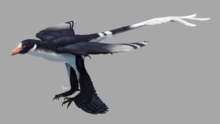 | |||
|
G. lujiatunensis |
Beipiao |
Lujiatun Bed |
An incomplete specimen. |
A dromaeosaurid | ||
|
S. haoiana |
Yixian |
Dawangzhangzi Bed |
Might be a junior synonym of Sinornithosaurus millenii. | |||
|
S. millenii |
Beipiao |
Jianshangou Bed |
Three specimens with skulls and postcrania, two with preserved feathers.[38] Feathered integument is also preserved.[38][39] |
A dromaeosaurid, the first ever found with feather impressions. | ||
|
T. ostromi |
Lingyuan |
Dawangzhangzi Bed |
A dromaeosaurid | |||
|
Z. suni |
Jianchang |
One nearly complete skeleton with preserved feathers, including long tail feathers and large wing feathers. |
A dromaeosaurid | |||
|
Z. yangi |
Lingyuan |
A partial skeleton includes an arm, legs, vertebrae, ribs, and most of the tail.[41] |
A microraptorian dromaeosaurid with very long legs.[41] | |||
|
Unnamed dromaeosaurid |
Specimen NGMC 91 |
Lingyuan |
Dawangzhangzi Bed |
Complete specimen with feather imprints |
A juvenile dromaeosaurid that may be a specimen of Sinornithosaurus millenii.[42][43] Informally nicknamed "Dave". |
Ornithomimosaurs
[edit]Color key
|
Notes Uncertain or tentative taxa are in small text; |
| Genus | Species | County | Member | Material | Notes | Images |
|---|---|---|---|---|---|---|
|
H. qingyi |
Beipiao |
Lujiatun |
A primitive ornithomimosaur[44] |
 | ||
|
S. orientalis |
Beipiao |
Lujiatun Bed |
"Articulated skull and incomplete skeleton."[45] |
A primitive ornithomimosaur |
Oviraptorosaurs
[edit]Color key
|
Notes Uncertain or tentative taxa are in small text; |
| Genus | Species | County | Member | Material | Notes | Images |
|---|---|---|---|---|---|---|
|
C. dongi |
Beipiao |
Jianshangou Bed |
"[One] partial postcranium with feather imprints."[46] |
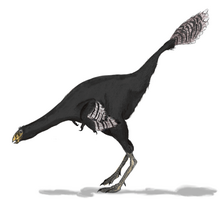   | ||
|
C. zoui |
Beipiao |
Jianshangou Bed |
Common, only over a small region | |||
|
C. sp.[47] |
||||||
|
I. gauthieri |
Beipiao |
Lujiatun Bed |
"[One] skull [and a] partial cervical."[46] |
An oviraptorosaur | ||
|
N. wangi |
Complete skeleton with feather impressions.[48] |
An oviraptorosaur | ||||
|
P. robusta |
Beipiao |
Jianshangou Bed |
"Nearly complete skull and skeleton, at least [two] individuals."[49] |
A possible relative of Incisivosaurus | ||
|
S. yixianensis |
Two specimens |
An oviraptorosaur, also present in the Jiufotang Formation[50] | ||||
|
X. ganqi |
Liaoning |
Dakangpu Bed |
One nearly complete specimen (IVPP V13390), minus the head |
Therizinosaurs
[edit]Color key
|
Notes Uncertain or tentative taxa are in small text; |
| Genus | Species | County | Member | Material | Notes | Images |
|---|---|---|---|---|---|---|
|
B. inexpectus |
Jianshangou Bed |
"Incomplete skeleton with integument."[52] |
  | |||
| Jianchangosaurus | J. yixianensis | Jianchang | A nearly complete juvenile specimen with feather impressions.[53] | A therizinosaur |
Troodontids
[edit]| Genus | Species | County | Member | Material | Notes | Images |
|---|---|---|---|---|---|---|
| Daliansaurus | D. liaoningensis | Beipiao | Lujiatun Bed | A very complete specimen.[54] | A troodontid |  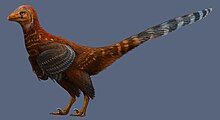   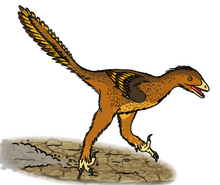  |
|
J. tengi |
Beipiao |
Dawangzhangzi Bed |
A very complete specimen with feather impressions.[55] |
A troodontid | ||
| Liaoningvenator | L. curriei | Beipiao | A very complete specimen. | A troodontid | ||
|
M. long |
Beipiao |
Lujiatun Bed |
A small troodontid fossilized in a sleeping position | |||
|
S. changii |
Beipiao |
Lujiatun Bed |
Three specimens with partial skulls and postcrania.[56][57] Hundreds of additional specimens known but undescribed. |
A troodontid | ||
|
S. magnodens |
Beipiao |
Lujiatun Bed |
A troodontid | |||
|
Undescribed deinonychosaur/possible troodontid |
Dawangzhangzi Bed |
One specimen with feather imprints |
A possible troodontid.[58] | |||
|
Undescribed troodontid |
Specimen CAGS-IG01-004 |
Lujiatun Bed |
Skull and partial skeleton |
A troodontid similar to Mei.[59] |
Tyrannosaurs and other theropods
[edit]Color key
|
Notes Uncertain or tentative taxa are in small text; |
| Genus | Species | County | Member | Material | Notes | Images |
|---|---|---|---|---|---|---|
|
D. paradoxus |
Beipiao |
Lujiatun & Jianshangou Bed |
Rare |
  | ||
|
lower Jianshangou Bed |
Footprints belonging to the Grallator form taxon, belonging to a small theropod. Of known Yixian theropods, the footprints most closely match Caudipteryx.[60] | |||||
|
R. kriegsteini |
A tyrannosaurid, probably from higher Mongolian strata. | |||||
|
S. heilmanni |
Initially reported from the Dawangzhangzi Bed, probably from the Daohugou Beds instead.[61] | |||||
|
Y. huali |
Unknown |
Three nearly complete skeletons of various ages |
A large tyrannosauroid[62] | |||
|
Unnamed theropod |
Not yet described |
Lujiatun Bed |
Partial post-cranial skeleton[63] |
Pterosaurs
[edit]The pterosaurs listed below were compiled in a survey by Wang and Zhou in 2006, unless otherwise noted.[65]
| Genus | Species | County | Member | Material | Notes | Images |
|---|---|---|---|---|---|---|
|
B. chenianus |
Jianshangou Bed |
A ctenochasmatid |
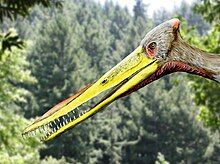     | |||
|
B. cuiae |
Jianshangou Bed |
A boreopterid | ||||
|
C. grabaui |
Dawangzhangzi Bed |
A ctenochasmatid | ||||
|
E. prolatus |
Jianshangou Bed[67] |
A ctenochasmatid | ||||
| Eopteranodon | E. lii[68] | Beipiao | A tapejarid | |||
| E. yixianensis[69] | Beipiao | Jianshangou Bed | A tapejarid | |||
|
E. yangi |
Jianshangou Bed |
A ctenochasmatid | ||||
|
G. changae[67] |
Jianshangou Bed[67] |
A ctenochasmatid | ||||
|
G. jingangshanensis |
Jianshangou Bed |
A ctenochasmatid | ||||
| Haopterus |
H. gracilis |
Jianshangou Bed |
An ornithocheirid | |||
| Luchibang[71] | L. xingzhe | One nearly complete articulated skeleton (ELDM 1000) | An istiodactylid, the most complete known | |||
|
M. zhuiana |
Lujiatun bed? |
A ctenochasmatid | ||||
|
N. liuae |
Jianshangou or Dawangzhangzi bed |
A pterodactyloid[72] | ||||
| Nurhachius | N. sp. | Jingangshan Member[73] | An incomplete specimen[73] | An istiodactylid | ||
|
P. qiui |
Jianshangou Bed |
A ctenochasmatid[67] | ||||
| Yixianopterus | Y. jingangshanensis | An istiodactyliform | ||||
|
Z. longirostris |
Jianshangou Bed |
A boreopterid.[74] May be adult form of Boreopterus.[75] |
Misc. reptiles
[edit]Choristoderans
[edit]Color key
|
Notes Uncertain or tentative taxa are in small text; |
| Genus | Species | County | Member | Material | Notes | Images |
|---|---|---|---|---|---|---|
|
H. lingyuanensis |
Dawangzhangzi Bed |
  | ||||
|
H. baitaigouensis |
Jingangshan Bed |
Thousands of specimens |
||||
|
M. splendens |
Dawangzhangzi Bed |
|||||
|
S. lingyuanensis |
Dawangzhangzi Bed |
Junior synonym of Hyphalosaurus lingyuanensis |
Lizards
[edit]| Genus | Species | County | Member | Material | Notes | Images |
|---|---|---|---|---|---|---|
|
D. longidigitus |
Jianshangou Bed |
A lizard related to shinisaurs |
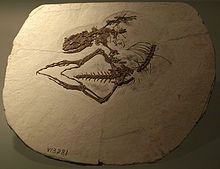 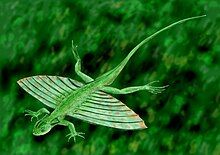 | |||
|
L. acanthocaudata[76] |
Jianshangou or Dawangzhangzi bed |
A lizard related to geckos and skinks | ||||
|
X. zhaoi |
Jianshangou Bed |
A gliding lizard related to chameleons and dragon lizards | ||||
|
Y. tenuis |
Dawangzhangzi & Jingangshan Beds |
A lizard related to geckos and skinks |
Turtles
[edit]Color key
|
Notes Uncertain or tentative taxa are in small text; |
| Genus | Species | County | Member | Material | Notes | Images |
|---|---|---|---|---|---|---|
|
M. liaoxiensis[77] |
Jianshangou Bed |
Reclassified as Ordosemys liaoxiensis[78] |
 | |||
|
M. manchoukuoensis[16] |
Jingangshan Bed |
|||||
|
O. liaoxiensis[78] |
Jianshangou Bed |
Mammals
[edit]Color key
|
Notes Uncertain or tentative taxa are in small text; |
The mammals listed below were compiled in a survey by Meng and colleagues in 2006, unless otherwise noted.[79]
| Genus | Species | County | Member | Material | Notes | Images |
|---|---|---|---|---|---|---|
|
A. yanensis[80] |
Beipiao |
Lujiatun Bed |
A eutherian |
    | ||
|
A. cifellii |
Lingyuan |
Dawangzhangzi Bed |
A spalacotheriid "symmetrodont" | |||
| Ambolestes[81] | A. zhoui | Nincheng | Jianshangou Bed | A eutherian | ||
|
C. lii |
Lingyuan |
Dawangzhangzi Bed |
A eutriconodont | |||
|
E. scansoria |
Lingyuan |
Dawangzhangzi Bed |
A tribosphenidan, possibly a eutherian or stem-therian | |||
|
G. zofiae |
Beipiao |
Lujiatun Bed |
A gobiconodont | |||
|
G. luoianus[83] |
Lujiatun Bed |
A gobiconodont; junior synonym of G. zofiae | ||||
|
J. jenkinsi |
Chaoyang |
Jianshangou Bed |
A eutriconodont | |||
|
J. liaoningensis |
Beipiao |
Lujiatun Bed |
An amphidontid | |||
|
J. cheni |
A eutriconodont | |||||
|
M. sinensis |
Chaoyang |
Jianshangou Bed |
A zhangeotheriid "symmetrodont" | |||
|
M. asiaticus[86] |
Beipiao |
Lujiatun Bed |
A zhangeotheriid "symmetrodont" | |||
|
M. lujiatunensis |
Beipiao |
Lujiatun Bed |
A gobiconodont | |||
| Origolestes | O. lii | A zhangeotheriid "symmetrodont" | ||||
|
R. giganticus |
Beipiao |
Lujiatun Bed |
A gobiconodont | |||
|
R. robustus |
Beipiao |
Lujiatun Bed |
A large gobiconodont, which ate small dinosaurs | |||
|
S. lingyuanensis |
Lingyuan |
Jianshangou and Dawangzhangzi Beds |
A multituberculate | |||
|
S. szalayi |
Lingyuan |
Dawangzhangzi Bed |
A therian, initially interpreted as a metatherian and later reinterpreted as a eutherian | |||
|
Y. allini[87] |
Fengning[87] |
A eutricondodont | ||||
|
Z. quinquecuspidens |
Chaoyang |
Jianshangou Bed |
A zhangeotheriid "symmetrodont" |
Amphibians
[edit]Color key
|
Notes Uncertain or tentative taxa are in small text; |
| Genus | Species | County | Member | Material | Notes | Images |
|---|---|---|---|---|---|---|
|
C. sanyanensis |
Sihetun |
Jianshangou Bed |
Junior synonym of Liaobatrachus |
 | ||
|
L. subsolanus |
Paozhanggou |
Fengshan Bed |
A urodelan | |||
|
L. grabaui |
Sihetun |
Jianshangou Bed |
A spadefoot toad | |||
|
L. zhaoi |
Beipiao & Heitizigou |
Lujiatun Bed & Jianshangou Bed |
A spadefoot toad | |||
|
Mesophryne |
M. beipiaoensis |
Beipiao & Heitizigou |
Lujiatun Bed & Jianshangou Bed |
Junior synonym of Liaobatrachus | ||
|
S. fengshanensis |
Paozhanggou |
Fengshan Bed |
A urodelan |
Fish
[edit]| Genus | Species | County | Member | Abundance | Notes | Images |
|---|---|---|---|---|---|---|
|
Hybodontoidea indet. |
Family, genus and species indeterminate |
An elasmobranch known from a single dorsal fin spine[88] |
    | |||
|
L. davidi |
Jianshangou & Dawangzhangzi Beds |
Also present in the Jiufotang Formation & Huajiying Formation |
||||
|
L. muroii |
Jingangshan Bed |
|||||
|
L. sinensis |
Jianshangou Bed |
|||||
|
M. mengae |
A lamprey | |||||
|
P. pani |
Jianshangou & Dawangzhangzi Bed |
Also present in the Jiufotang Formation |
A peipiaosteid fish related to sturgeons | |||
|
P. liui |
Dawangzhangzi Bed |
Also present in the Jiufotang & Huajiying Formations |
||||
|
S. liaoningensis |
Jianshangou Bed |
A bowfin | ||||
|
Y. longidorsalis |
Also present in the Huajiying Formation |
A peipiaosteid |
Invertebrate fauna of the Yixian Formation
[edit]The invertebrate species listed below follow a survey by Chen and colleagues published in 2005, unless otherwise noted.[77]
Arachnids
[edit]The arachnid species listed below follow a catalogue compiled by Dunlop, Penney and Jekel in 2010, unless otherwise noted.[89]
| Genus | Species | County | Member | Abundance | Notes | Images |
|---|---|---|---|---|---|---|
|
A.? aethus |
||||||
|
A.? beipiaoensis |
||||||
|
A.? liaoxiensis |
||||||
|
A.? reheensis |
||||||
|
C. liaoningensis |
||||||
|
G.? liaoningensis |
||||||
|
T.? atalus |
Beetles (Coleoptera)
[edit]| Genus | Species | County | Member | Abundance | Notes | Images |
|---|---|---|---|---|---|---|
|
A. complanus |
||||||
|
A. antennatus |
Desmatin click beetles[90] | |||||
|
A. clavatus |
||||||
|
A. dolini |
||||||
|
C. longipoda |
A beetle[91] | |||||
|
D. cognatus |
A desmatin click beetle[90] | |||||
|
F. pervalimand |
An eodromeine trachypachid beetle[92] | |||||
|
G. orthochilus |
||||||
|
H. gracilis |
Hydrophiloid water scavenger beetles[94] | |||||
|
H. hydraenoides |
||||||
|
H. shatrovskiyi |
||||||
| Lasiosyne | L. integera | Huangbanjigou Village, Liaoning Province, northeastern China.[95] | A lasiosynid beetle.[95] | |||
| L. parva | Huangbanjigou Village, Liaoning Province, northeastern China.[95] | A lasiosynid beetle.[95] | ||||
|
L. hongi |
||||||
|
M. gracilicruralis |
A mordellid beetle[97] | |||||
|
O. yixianus |
||||||
|
P. dilatatus |
A desmati click beetle[90] | |||||
|
P. incanus |
||||||
|
S. validus |
A beetle[91] | |||||
|
S. silinae |
A hydrophiloid water scavenger beetle[94] | |||||
|
S. breviventer |
||||||
|
S. euglypheus |
||||||
|
S. longisetosus |
Crustaceans
[edit]| Genus | Species | County | Member | Abundance | Notes | Images |
|---|---|---|---|---|---|---|
| Chenops[101] | C. oblongus | Notostracans | 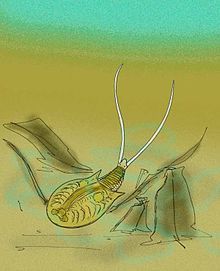
| |||
| C. yixianensis | ||||||
| Cricoidoscelosus | C. aethus | Junior synonym of Palaeocambarus[102] | ||||
| Cypridea | C. (Cypridea) liaoningensis | Jianshangou Bed | Ostracods | |||
| C. (C.) sihetunensis | Jianshangou Bed | |||||
| C. (C.) veridica arguta | Jingangshan Bed | |||||
| C. (C.) sp. | Jianshangou Bed | |||||
| C. (Ulwellia) beipiaoensis | Beipiao | Jianshangou Bed | ||||
| Damonella | D. formosa | Jianshangou Bed | An ostracod | |||
| Darwinula | D. leguminella | Jianshangou Bed | An ostracod | |||
| Diestheria | D. jeholensis | Jianshangou Bed | Clam shrimps | |||
| D. yixianensis | Dawangzhangzi Bed | |||||
| D.? sp. | Jianshangou Bed | |||||
| Eosestheria | E. jingangshanensis | Jingangshan Bed | Clam shrimps | |||
| E. lingyuanensis | Dawangzhangzi Bed | |||||
| E. aff. middendorfii | Jingangshan Bed | |||||
| E. ovata | Jianshangou Bed | |||||
| E. sihetunensis | Jianshangou Bed | |||||
| Eosestheriopsis | E. gujialingensis | Jianshangou Bed | A clam shrimp | |||
| Jeholops[101] | J. hongi | A notostracan | 
| |||
| Liaoningogriphus | L. quadripartitus | Jianshangou and Dawangzhangzi beds | A shrimp | |||
| Lycopterocypris | L. infantilis | Jianshangou Bed | An ostracod | |||
| Mantelliana | M. sp. | Jianshangou Bed | An ostracod | |||
| "Mongolarachne" | "M." chaoyangensis | Dawangzhangzi Beds | Junior synonym of Palaeocambarus[103] | |||
| Mongolianella | M. cf. palmosa | Jianshangou Bed | An ostracod | |||
| Palaeocambarus | P. licenti | A crayfish[104] |  | |||
| Rhinocyrpis | R. jurassica | Jianshangou Bed | An ostracod | |||
| Timiriasevia | T. jianshangouensis | Jianshangou Bed | An ostracod | |||
| ?Yanjiestheria | Y.? beipiaoensis | Beipiao | Jianshangou Bed | A clam shrimp | ||
| Yanshania | Y. dabeigouensis | Jianshangou Bed | An ostracod |
Dragonflies (Odonata)
[edit]Color key
|
Notes Uncertain or tentative taxa are in small text; |
The dragonfly species listed below follow a review compiled by Zhang, Ren and Panf in 2008, unless otherwise noted.[105]
| Genus | Species | County | Member | Abundance | Notes | Images |
|---|---|---|---|---|---|---|
| Abrohemeroscopus | A. mengi | A dragonfly |  | |||
| Aeschnidium | A. heishankowense | Reclassified as Sinaeschnidia heishankowense[106] | ||||
| A. sp. | ||||||
| Archaeogomphus | A. labius | Nymphs[106] | Reclassified as Yixiangomphus labius,[107] which is a junior synonym of Sinaeschnidia cancellosa[106] | |||
| Bellabrunetia | B. catherinae | A dragonfly | ||||
| Chrysogomphus | C. beipiaoensis | A dragonfly | ||||
| Dissurus | D. liaoyuanensis[107] | Poorly preserved nymph[106] | Reclassified as Sinaeschnidia cf. cancellosa[106] | |||
| Dracontaeschnidium | D. orientale | A dragonfly | ||||
| Hebeiaeschnidia | H. fengningensis | A dragonfly | ||||
| Huaxiagomphus | H. taushanensis | A dragonfly[107] | ||||
| Liogomphus | L. yixianensis | A dragonfly | ||||
| Mesocordulia |
M. boreala |
A corduliid dragonfly[96] | ||||
| Palaeogomphus | P. labius | A dragonfly, reclassified as of Yixiangomphus labius,[107] which is a junior synonym of Sinaeschnidia cancellosa[106] | ||||
| Parapetala | P. liaoningensis | A dragonfly | ||||
| P. yixianensis | Jianshangou Unit[108] | |||||
| Protoliupanshania | P. wangi | Jianshangou Unit[108] | A liupanshaniid dragonfly | |||
| Pseudocymatophlebia | P. bisecta | Ningcheng County[109] | A well-preserved specimen.[109] | An aktassiid dragonfly | ||
| Pseudoliupanshania | P. magnanicellula | Jianshangou Unit[108] | ||||
| Pseudosamarura | P. largina[91] | One specimen, nymph[106] | Reclassified as Sinaeschnidia cf. cancellosa[106] | |||
| Rudiaeschna | R. limnobia | An aeshnid dragonfly[96] | ||||
| Sinaeschnidia | S. heishankowense | Jianshangou & Dawangzhangzi Beds | Adults and nymphs[106] | |||
| S. cancellosa[106] | Junior synonym of S. heishankowense[110] | |||||
| S. sp. | Indeterminate nymph specimens[106] | Some nymph specimens have been given their own genera and species though probably belong so S. heishankowense but too poorly preserved to be certain[106] | ||||
| Sinogomphus | S. taoshanensis | A dragonfly | ||||
| Sinojagoria | S. imperfecta | A dragonfly | ||||
| Sopholibellula | S. amoena | Dragonflies | ||||
| S. eleganti | ||||||
| Stylaeschnidium | S. rarum | A dragonfly | ||||
| Telmaeshna | T. paradoxica | Beipiao | A dragonfly | |||
| Turanophlebia | T. liaoningensis | Beipiao[111] | Jianshangou Unit[111] | A tarsophlebiid dragonfly. | ||
| Yixiangomphus | Y. labius | Nymphs[106] | Junior synonym of Sinaeschnidia cancellosa[106] |
Flies (Diptera)
[edit]| Genus | Species | County | Member | Abundance | Notes | Images |
|---|---|---|---|---|---|---|
| Alleremonomus | A. xingi | Jianshangou Bed | A brachyceran fly | |||
| Atalosciophila | A. yanensis | A mycetophilid gnat[112] | ||||
| Chironomaptera | C. gregaria | A phantom midge | ||||
| Gigantoberis | G. liaoningensis | A soldier fly[113] | ||||
| Lichnoplecia | L. kovalevi | A protopleciid fly[114] | ||||
| Palaepangonius | P. eupterus | A horse-fly[96] | ||||
| Protapiocera | P. megista | An asiloid fly[96] | ||||
| Protempis | P. minuta | A brachyceran fly[96] | ||||
| Protonemestrius | P. jurassicus | A tangle-veined fly[96] |
Wasps (Hymenoptera)
[edit]| Genus | Species | County | Member | Abundance | Notes | Images |
|---|---|---|---|---|---|---|
| Abropelecinus | A. annulatus | Beipiao | An iscopinine pelecinid[115] | |||
| Angaridyela | A. robusta | Jianshangou Bed | A sawfly | |||
| Azygopelecinus | A. clavatus | Beipiao |
An iscopinine pelecinid[115] | |||
| Chengdeserphus | C. petidatus | A proctotrupid wasp[96] | ||||
| Cretevania | C. exquisita | Beipiao | Hatchet wasps[116] | |||
| C. pristine | Jianshangou bed | |||||
| C. vesca | ||||||
| Hoplitolyda | H. duolunica | The largest known sawfly ever[117] | ||||
| Liaotoma | L. linearis | A xyelotomid woodwasp[96] | ||||
| Manlaya | M. flexuosus | An aulacid woodwasp[96] | ||||
| Procretevania | P. exquisita |
Reclassified as Cretevania spp.[118] | ||||
| P. pristine | ||||||
| P. vesca | ||||||
| Rudisiricius | R. belli |
Praesiricid sawflies[119] | ||||
| R. celsus | ||||||
| R. crassinodus | ||||||
| Scolichneumon | S. rectivenius | An ichneumonoid wasp[96] | ||||
| Sinopelecinus | S. viriosus | A pelecinid[115] | ||||
| Tanychora | T. exquisita | Jianshangou Bed | An ichneumon wasp |
Other insects
[edit]| Genus | Species | County | Member | Abundance | Notes | Images |
|---|---|---|---|---|---|---|
| Abrigramma | A. calophleba | A kalligrammatid lacewing[120] |  | |||
| Alloraphidia | A. bliquivenatica[91] | Snakeflies | ||||
| A. longistigmasa | Jianshangou Bed | |||||
| Archeraphidia | A. shangyuanensis | A snakefly[91] | ||||
| Baissopterus | B. liaoningensis | A snakefly[91] | ||||
| Caenoephemera | C. shangyuanensis | Jianshangou Bed | A mayfly[91] | |||
| Caloraphidia | C. glossophylla | A snakefly[96] | ||||
| Choromyrmeleon | C. othneius | An antlion[96] | ||||
| Circulaboilus | C. aureus | A grig[121] | ||||
| Cretophasmomima | C. melanogramma | A stick insect[122] | 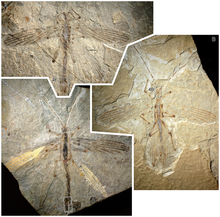 | |||
| ?Ephemeropsis | ?E. trisetalis | Jianshangou and Jingangshan beds | A mayfly. Chinese specimens probably represent species of Epicharmeropsis[123] | |||
| Epicharmeropsis | E. hexavenulosus[123] | Pingquan | Mayflies | |||
| E. quadrivenulosus[123] | Beipiao | Jianshangou Bed |  | |||
| Hagiphasma | H. paradoxa | Jianshangou Bed | A stick insect | |||
| Ilerdocossus | I. beipiaoensis | Palaeontinid hemipterans[124][125] | ||||
| I. exiguus | ||||||
| I. exquisitus | ||||||
| I. fengningensis | ||||||
| I. hui | ||||||
| I. pingquanensis | ||||||
| Ithigramma | I. multinervia | Kalligrammatid lacewings[120] |  | |||
| Kalligramma | K. liaoningensis | Jianshangou Bed | ||||
| Karatavoblatta | K. formosa | A cockroach[91] | ||||
| Liaoaphidia | L. fornicata | A snakefly[91] | ||||
| Liaonemobius | L. tanae | A sword-tail cricket[96] | ||||
| Longicellochrysa | L. yixiana | A mesochrysopid lacewing[126] | ||||
| Mesascalaphus | M. yangi | An owlfly[96] | ||||
| Mesolygaeus | M. laiyangensis | A water bug[91] | ||||
| Metabittacus | M. colosseus | Jianshangou Bed | A scorpionfly[127] | |||
| Miracossus | M. gongi | Palaeontinid hemipterans[124] | ||||
| M. ingentius | ||||||
| Nipponoblatta | N. acerba | Jianshangou Bed | A cockroach | |||
| Oloberotha | O. sinica | A beaded lacewing[96] | ||||
| Oregramma | O. aureolosa | Kalligrammatid lacewings[120] |  | |||
| O. illecebrosa |  | |||||
| Pseudopulex | P. magnus | Stem-fleas[128][129] | ||||
| P. tanlan |  | |||||
| Renphasma | R. sinica | A stick insect[130] | 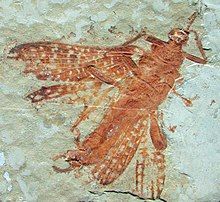 | |||
| Saurophthirus | S. exquisitus | Stem-fleas[131] | ||||
| S. laevigatus |  | |||||
| Sinochresmoda | S. magnicornia | A chresmodid water-skiing insect[132] | ||||
| Sinosharaperla | S. zhaoi | Beipiao | A stonefly[133] | |||
| Sinoviparosiphum | S. lini | An aphid[96] | ||||
| Sophogramma | S. lii | Jianshangou Bed | Kalligrammatid lacewings[134][120] |  | ||
| S. pingquanica | ||||||
| Tetraphelerus | T. laetus | A moth[91] | ||||
| Tyrannopsylla | T. beipiaoensis | A stem-flea[135] | ||||
| Varicapitatus | V. sinuolatus | "Huangbanjigou, Chaomidian Village, Beipiao City."[136] | A hemipteran | |||
| Unnamed Vitimotauliidae | Unnamed | A caddisfly pupa, likely belonging to the Vitimotauliidae[137] |
Molluscs
[edit]| Genus | Species | County | Member | Abundance | Notes | Images |
|---|---|---|---|---|---|---|
| Amplovalvata | A. sp. | Jianshangou Bed | A gastropod | |||
| Arguniella | A. lingyuanensis | Jianshangou Bed | A bivalve, also present in the Jiufotang and Fuxin Formations | |||
| A. yanshanensis | Jianshangou Bed | A bivalve, also present in the Jiufotang Formation | ||||
| Bithynia | B. haizhouensis | Jingangshan Bed | A gastropod | |||
| Corbicula | C. anderssoni | Jianshangou Bed | Reclassified as Sphaerium anderssoni | |||
| C. jeholense | Reclassified as Sphaerium jeholense | |||||
| Gyraulus | G. sp. | Jianshangou Bed | A ramshorn snail | |||
| Probaicalia | P. vitimensis | Jianshangou Bed | A gastropod | |||
| Ptychastylus | P. harpaeformis | Jianshangou Bed | Gastropods | |||
| P. cf. phillipi | Jianshangou Bed | |||||
| Sphaerium | S. anderssoni | Jianshangou Bed | A fingernail clam, also present in the Jiufotang Formation | |||
| S. jeholense | Junior synonym of S. anderssoni | |||||
| S. selenginense | Junior synonym of S. anderssoni | |||||
| ?Viviparus | V.? cf. matsumotoi | Jingangshan Bed | A snail |
Flora of the Yixian Formation
[edit]Conifers
[edit]The coniferous trees and shrubs listed below were compiled in a survey by Wang and colleagues in 2006, unless otherwise noted.[138]
| Genus | Species | County | Member | Abundance | Notes | Images |
|---|---|---|---|---|---|---|
| Brachyphyllum | A cypress-like conifer | |||||
| Cephalotaxopsis | A yew | |||||
| Cunninghamia | A cypress | |||||
| Elatides | A cypress | |||||
| Elatocladus | E. leptophyllus | Conifers of uncertain classification | ||||
| E. manchurica[16] | ||||||
| Liaoningocladus | L. boii | Jingangshan Bed | A conifer of uncertain classification | |||
| Pagiophyllum | A cypress-like conifer | |||||
| Pityocladus | A pine | |||||
| Pityolepis | P. sp.[16] | A pine | ||||
| Pityophyllum | P. cf. lindstroemi[16] | A pine | ||||
| Pityostrobus | A pine | |||||
| Podozamites | P. lanceolatus[16] | A conifer of uncertain classification | ||||
| Schizolepis | S. jeholensis[16] | |||||
| ?Sequoia | S.? jeholensis[16] | |||||
| Taxus | A yew | |||||
| Torreya | A yew | |||||
|
Y. sinensis[16] |
Ferns
[edit]| Genus | Species | County | Member | Abundance | Notes | Images |
|---|---|---|---|---|---|---|
| Cladophlebis | C. spp.[16] | |||||
| Coniopteris | C. sp.[16] | |||||
| Onychiopsis | O. elongata[16] | Junior synonym of O. psilotoides | ||||
| O. psilotoides[16] | ||||||
| ?Ruffordia | R.? sp.[16] |
Flowering plants
[edit]| Genus | Species | County | Member | Abundance | Notes | Images |
|---|---|---|---|---|---|---|
| Archaefructus | A. eoflora | Jianshangou Bed | A primitive, aquatic angiosperm | 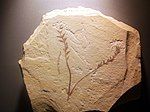 | ||
| A. liaoningensis | Jianshangou Bed | |||||
| A. sinensisis | Dawangzhangzi Bed | |||||
| Callianthus | C. dilae[139] | Liaoning | A plant with true flowers | |||
| ?Davallia | D.? niehhutzuensis[16] | |||||
| Erenia | E. stenoptera[139] | Liaoning | Actually a specimen of Callianthus | |||
| Leefructus | L. mirus[140] | A eudicot | ||||
| Liaoxia | L. chenii[16] | |||||
| ?Potamogeton | P.? jeholensis[16] | |||||
| Ranunculus | R. jeholensis[16] | Junior synonym of Potamogeton jeholensis | ||||
| Sinocarpus | S. decussatus | A primitive eudicot |
Ginkgos
[edit]| Genus | Species | County | Member | Abundance | Notes | Images |
|---|---|---|---|---|---|---|
| Baiera | B. cf. gracilis[16] | |||||
| B. orientalis[16] | ||||||
| Czekanowskia | C. rigida[16] | |||||
| Ginkgo | G. apodes[141] | |||||
| Ginkgoites | G. sibiricus[16] | |||||
| Leptostrobus | L. sp.[16] | |||||
| ?Nageiopsis | N.? sp.[16] | |||||
| Phoenicopsis | P. cf. augustifolia[16] | |||||
| Solenites | S. sp.[16] | |||||
| Sphenobaiera | S. longifola[16] |
Other plants
[edit]| Genus | Species | County | Member | Abundance | Notes | Images |
|---|---|---|---|---|---|---|
| Archaeamphora | A. longicervia | Originally described as pitcher plant, later study confirmed that it is likely to be an insect galls on Liaoningocladus. |  | |||
| Chaoyangia | C. liangii[142] | A gnetale gymnosperm | ||||
| Chaoyangicarpus | C. liangii[16] | Junior synonym of Chaoyangia liangii | ||||
| Ephedra | E. sp. | A gymnosperm | ||||
| Equisetum | E. sp. | A horsetail | ||||
| Eragrosites | E. changii[142] | A grass-like gnetale gymnosperm | ||||
| Siphonospermum | S. simplex[143] | Beipiao | Jianshangou Bed | A gnetale gymnosperm | ||
| Tyrmia | T. sp.[16] | A bennettite |
References
[edit]- ^ Zhong, Yuting; Huyskens, Magdalena H; Yin, Qing-Zhu; Wang, Yaqiong; Ma, Qiang; Xu, Yi-Gang (2021-04-12). "High-precision geochronological constraints on the duration of 'Dinosaur Pompeii' and the Yixian Formation". National Science Review. 8 (6): nwab063. doi:10.1093/nsr/nwab063. ISSN 2095-5138. PMC 8288181. PMID 34691675.
- ^ Wang, X.; You, H.; Meng, Q.; Gao, C.; Chang, X.; Liu, J. (2007). "Dongbeititan dongi, the first sauropod dinosaur from the Lower Cretaceous Jehol Group of western Liaoning Province, China". Acta Geologica Sinica (English Edition). 81 (6): 911–916. Bibcode:2007AcGlS..81..911W. doi:10.1111/j.1755-6724.2007.tb01013.x. S2CID 128812879.
- ^ a b Barrett, P.M.; Wang, X. (2007). "Basal titanosauriform (Dinosauria, Sauropoda) teeth from the Lower Cretaceous Yixian Formation of Liaoning Province, China" (PDF). Palaeoworld. 16 (4): 265–271. doi:10.1016/j.palwor.2007.07.001.
- ^ a b Zhang, Honggang; Yin, Yalei; Pei, Rui; Zhou, Changfu (2024-04-27). "Early-diverging Titanosauriform (Dinosauria, Sauropoda) Teeth from the Lower Cretaceous Yixian Formation of Southeastern Inner Mongolia, Northeast China". Acta Geologica Sinica - English Edition. 98 (2): 303–310. doi:10.1111/1755-6724.15169. ISSN 1000-9515.
- ^ Chang-fu Zhou; Wen-hao Wu; Toru Sekiya; Zhi-ming Dong (2018). "A new Titanosauriformes dinosaur from Jehol Biota of western Liaoning, China". Global Geology. 37 (2): 327–333. doi:10.3969/j.issn.1004-5589.2018.02.001.
- ^ Mo, Jinyou; Ma, Feimin; Yu, Yilun; Xu, Xing (2022-12-09). "A New Titanosauriform Sauropod with An Unusual Tail from the Lower Cretaceous of Northeastern China". Cretaceous Research. 144: 105449. doi:10.1016/j.cretres.2022.105449. ISSN 0195-6671. S2CID 254524890.
- ^ a b c Xu, X.; Norell, M.A. (2006). "Non-Avian dinosaur fossils from the Lower Cretaceous Jehol Group of western Liaoning, China". Geological Journal. 41 (3–4): 419–437. doi:10.1002/gj.1044. S2CID 32369205.
- ^ "Table 17.1," in Weishampel, et al. (2004). Page 367.
- ^ "Table 22.1," in Weishampel, et al. (2004). Page 480.
- ^ Yang, Yuqing; Wu, Wenhao; Dieudonné, Paul-Emile; Godefroit, Pascal (2020-09-08). "A new basal ornithopod dinosaur from the Lower Cretaceous of China". PeerJ. 8: e9832. doi:10.7717/peerj.9832. ISSN 2167-8359. PMC 7485509. PMID 33194351.
- ^ "Table 18.1," in Weishampel, et al. (2004). Page 395.
- ^ "Table 19.1," in Weishampel, et al. (2004). Page 416.
- ^ a b Min Wang; Zhiheng Li; Qingguo Liu; Zhonghe Zhou (2020). "Two new Early Cretaceous ornithuromorph birds provide insights into the taxonomy and divergence of Yanornithidae (Aves: Ornithothoraces)". Journal of Systematic Palaeontology. 18 (21): 1805–1827. Bibcode:2020JSPal..18.1805W. doi:10.1080/14772019.2020.1836050. S2CID 229320421.
- ^ Zhou, Zhonghe; Zhang, Fucheng (2006). "A beaked basal ornithurine bird (Aves, Ornithurae) from the Lower Cretaceous of China". Zoologica Scripta. 35 (4): 363–373. doi:10.1111/j.1463-6409.2006.00234.x. S2CID 85222311.
- ^ a b c "Table 11.1," in Weishampel, et al. (2004). Page 211.
- ^ a b c d e f g h i j k l m n o p q r s t u v w x y z aa ab ac ad Smith, J.B., Harris, J.D., Omar, G.I., Dodson, P. and You, H. (2001). "Biostratigraphy and avian origins in northeastern China. Appendix: Biota of the Yixian Formation and the endemicity of its taxa." In Gauthier, J. and Gall, L.F. (eds.), New Perspectives on the Origin and Early Evolution of Birds: Proceedings of the International Symposium in Honor of John H. Ostrom. New Haven: Peabody Museum of Natural History, Yale University. ISBN 0-912532-57-2.
- ^ a b c d "Table 11.1," in Weishampel, et al. (2004). Page 212.
- ^ Zhang, Zihui; Gao, Chunling; Meng, Qingjin; Liu, Jinyuan; Hou, Lianhai; Zheng, Guangmei (2009). "Diversification in an Early Cretaceous avian genus: evidence from a new species of Confuciusornis from China". Journal of Ornithology. 150 (4): 783–790. doi:10.1007/s10336-009-0399-x. S2CID 21418230.
- ^ Zihui, Zhang; Lianhai, HOU; Yoshikasu, Hasegawa; O'Connor, Jingmai; Martin, Larry D.; Chiappe, Luis M. (2010). "The first Mesozoic heterodactyl bird from China". Acta Geologica Sinica. 80 (5): 631–635. doi:10.1111/j.1755-6724.2006.tb00285.x. S2CID 129069702.
- ^ "Table 11.1," in Weishampel, et al. (2004). Page 213.
- ^ Xiaoting Zheng; Jingmai K. O'Connor; Xiaoli Wang; Yan Wang; Zhonghe Zhou (2018). "Reinterpretation of a previously described Jehol bird clarifies early trophic evolution in the Ornithuromorpha". Proceedings of the Royal Society B: Biological Sciences. 285 (1871): 20172494. doi:10.1098/rspb.2017.2494. PMC 5805944. PMID 29386367.
- ^ Hou, L.H., Zhou, Z.H., Zhang, F.C., et al. (2002). "Mesozoic Birds from Western Liaoning." In China Shenyang, China: Liaoning Science and Technology Publishing House
- ^ Ji; Ji, Ji; Zhang, You; Zhang, Wang; Yuan (2002). "A new avialian bird - Jixiangornis orientalis gen. et sp. nov. - from the Lower Cretaceous of Western Liaoning, NE China". Journal of Nanjing University (Natural Sciences). 38 (6): 723–736.
- ^ a b Chiappe, L. M.; Zhao, B.; O'Connor, J. K.; Chunling, G.; Wang, X.; Habib, M.; Marugan-Lobon, J.; Meng, Q.; Cheng, X. (2014). "A new specimen of the Early Cretaceous bird Hongshanornis longicresta: Insights into the aerodynamics and diet of a basal ornithuromorph". PeerJ. 2: e234. doi:10.7717/peerj.234. PMC 3898307. PMID 24482756.
- ^ a b O'Connor, J.K.; Gao, K.-Q.; Chiappe, L.M. (2010). "A new ornithuromorph (Aves: Ornithothoraces) bird from the Jehol Group indicative of higher-level diversity" (PDF). Journal of Vertebrate Paleontology. 30 (2): 311–321. Bibcode:2010JVPal..30..311O. doi:10.1080/02724631003617498. S2CID 53489175.
- ^ a b c Jin, Fan; Zhang, Fucheng; Li, Zhiheng; Zhang, Jiangyong; Li, Chun; Zhou, Zhonghe (2008). "On the horizon of Protopteryx and the early vertebrate fossil assemblages of the Jehol Biota". Chinese Science Bulletin. 53 (18): 2820–2827. Bibcode:2008SciBu..53.2820J. doi:10.1007/s11434-008-0209-5. S2CID 133507763.
- ^ "Table 11.1," in Weishampel, et al. (2004). Page 214.
- ^ O'Connor, J.K. (2012). "A revised look at Liaoningornis longidigitris (Aves)". Vertebrata PalAsiatica. 50 (1): 25–37.
- ^ a b Chiappe, L.M.; Ji, S.; Ji, Q. (2007). "Juvenile Birds from the Early Cretaceous of China: Implications for Enantiornithine Ontogeny". American Museum Novitates (3594): 1. doi:10.1206/0003-0082(2007)3594[1:JBFTEC]2.0.CO;2. hdl:2246/5890. S2CID 85871695.
- ^ a b Wang, Min; O'Connor, Jingmai K; Bailleul, Alida M; Li, Zhiheng (2020-06-01). "Evolution and distribution of medullary bone: evidence from a new Early Cretaceous enantiornithine bird". National Science Review. 7 (6): 1068–1078. doi:10.1093/nsr/nwz214. ISSN 2095-5138. PMC 8289052. PMID 34692126.
- ^ a b c Gao, Chunling; Chiappe, Luis M.; Zhang, Fengjiao; Pomeroy, Diana L.; Shen, Caizhi; Chinsamy, Anusuya; Walsh, Maureen O. (September 2012). "A subadult specimen of the Early Cretaceous bird Sapeornis chaoyangensis and a taxonomic reassessment of sapeornithids". Journal of Vertebrate Paleontology. 32 (5): 1103–1112. doi:10.1080/02724634.2012.693865. ISSN 0272-4634.
- ^ O'Connor, Jingmai K.; Wang, X.; Chiappe, L.M.; Gao, C.; Meng, Q.; Cheng, X.; Liu, J. (2009). "Phylogenetic support for a specialized clade of Cretaceous enantiornithine birds with information from a new species". Journal of Vertebrate Paleontology. 29 (1): 188–204. Bibcode:2009JVPal..29..188O. doi:10.1080/02724634.2009.10010371. S2CID 196607241.
- ^ Gao, C.; Chiappe, L.M.; Meng, Q.; O'Connor, J.K.; Wang, X.; Cheng, X.; Liu, J. (2008). "A new basal lineage of Early Cretaceous birds from China and its implications on the evolution of the avian tail". Palaeontology. 51 (4): 775–791. Bibcode:2008Palgy..51..775G. doi:10.1111/j.1475-4983.2008.00793.x. S2CID 85431224.
- ^ "Table 4.1," in Weishampel, et al. (2004). Page 76.
- ^ Zhang, Fucheng; Kearns, Stuart L.; Orr, Patrick J.; Benton, Michael J.; Zhou, Zhonghe; Johnson, Diane; Xu, Xing; Wang, Xiaolin (2010). "Fossilized melanosomes and the colour of Cretaceous dinosaurs and birds" (PDF). Nature. 463 (7284): 1075–1078. Bibcode:2010Natur.463.1075Z. doi:10.1038/nature08740. PMID 20107440. S2CID 205219587.
- ^ Shu'an, JI; Chunling, GAO; Jinyuan, LIU; Qingjin, Meng; Qiang, JI (2007). "New material of Sinosauropteryx (Theropoda: Compsognathidae) from Western Liaoning, China". Acta Geologica Sinica. 81 (2): 177–182. Bibcode:2007AcGlS..81..177J. doi:10.1111/j.1755-6724.2007.tb00942.x. S2CID 131019046.
- ^ a b Gang Han; Luis M. Chiappe; Shu-An Ji; Michael Habib; Alan H. Turner; Anusuya Chinsamy; Xueling Liu & Lizhuo Han (15 July 2014). "A new raptorial dinosaur with exceptionally long feathering provides insights into dromaeosaurid flight performance". Nature Communications. 5, Article number: 4382: 4382. Bibcode:2014NatCo...5.4382H. doi:10.1038/ncomms5382. PMID 25025742. S2CID 205327789.
- ^ a b "Table 10.1," in Weishampel, et al. (2004). Page 198.
- ^ Azuma, (2005). The Flying Dinosaurs: Fukui Prefectural Dinosaur Museum. 118 pp.
- ^ Lü, Junchang; Brusatte, Stephen L. (2015). "A large, short-armed, winged dromaeosaurid (Dinosauria: Theropoda) from the Early Cretaceous of China and its implications for feather evolution". Scientific Reports. 5: Article number 11775. Bibcode:2015NatSR...511775L. doi:10.1038/srep11775. PMC 4504142. PMID 26181289.
- ^ a b c Xu, Xing; Qin, Zi-Chuan (2017). "A new tiny dromaeosaurid dinosaur from the Lower Cretaceous Jehol Group of western Liaoning and niche differentiation among the Jehol dromaeosaurids" (PDF). Vertebrata PalAsiatica. Archived from the original (PDF) on 2017-04-13.
- ^ Senter, Phil (2011). "Using creation science to demonstrate evolution 2: morphological continuity within Dinosauria (supporting information)". Journal of Evolutionary Biology. 24 (10): 2197–2216. doi:10.1111/j.1420-9101.2011.02349.x. PMID 21726330. S2CID 41172539.
- ^ Alan Hamilton Turner, Peter J. Makovicky and Mark Norell (2012). "A review of dromaeosaurid systematics and paravian phylogeny". Bulletin of the American Museum of Natural History. 371: 1–206. doi:10.1206/748.1. hdl:2246/6352. S2CID 83572446.
- ^ Jin Liyong, Chen Jun and Pascal Godefroit (2012). "A New Basal Ornithomimosaur (Dinosauria: Theropoda) from the Early Cretaceous Yixian Formation, Northeast China". In Godefroit, P. (ed.). Bernissart Dinosaurs and Early Cretaceous Terrestrial Ecosystems. Indiana University Press. pp. 467–487.
- ^ "Table 5.1," in Weishampel, et al. (2004). Page 138.
- ^ a b "Table 8.1," in Weishampel, et al. (2004). Page 166.
- ^ Zhou, Wang; Zhang; Xu (2000). "Important features of Caudipteryx - evidence from two nearly complete new specimens" (PDF). Vertebrata PalAsiatica (in Chinese). 38 (4): 241–254.
- ^ Ji Qiang; Lü Jun-Chang; Wei Xue-Fang; Wang Xu-Ri (2012). "A new oviraptorosaur from the Yixian Formation of Jianchang, Western Liaoning Province, China". Regional Geology of China (12): 2102–2107.
- ^ "Table 11.1," in Weishampel, et al. (2004). Page 216.
- ^ Xu, X.; Zheng, X.; You, H. (2010). "Exceptional dinosaur fossils show ontogenetic development of early feathers". Nature. 464 (7293): 1338–1341. Bibcode:2010Natur.464.1338X. doi:10.1038/nature08965. PMID 20428169. S2CID 205220207.
- ^ Rui Qiu; Xiaolin Wang; Qiang Wang; Ning Li; Jialiang Zhang; Yiyun Ma (2019). "A new caudipterid from the Lower Cretaceous of China with information on the evolution of the manus of Oviraptorosauria". Scientific Reports. 9 (1): Article number 6431. Bibcode:2019NatSR...9.6431Q. doi:10.1038/s41598-019-42547-6. PMC 6483983. PMID 31024012.
- ^ "Table 7.1," in Weishampel, et al. (2004). Page 152.
- ^ Pu, Hanyong; Kobayashi, Yoshitsugu; Lü, Junchang; Xu, Li; Wu, Yanhua; Chang, Huali; Zhang, Jiming; Jia, Songhai (2013-05-29). "An Unusual Basal Therizinosaur Dinosaur with an Ornithischian Dental Arrangement from Northeastern China". PLOS ONE. 8 (5): e63423. Bibcode:2013PLoSO...863423P. doi:10.1371/journal.pone.0063423. ISSN 1932-6203. PMC 3667168. PMID 23734177.
- ^ Shen, Caizhi; Lü, Junchang; Liu, Sizhao; Kundrát, Martin; Brusatte, Stephen L.; Gao, Hailong (2017-06-01). "A New Troodontid Dinosaur from the Lower Cretaceous Yixian Formation of Liaoning Province, China" (PDF). Acta Geologica Sinica - English Edition. 91 (3): 763–780. Bibcode:2017AcGlS..91..763S. doi:10.1111/1755-6724.13307. hdl:20.500.11820/dc010682-fce0-4db4-bef6-7b2b29f5be8a. ISSN 1755-6724. S2CID 129939153.
- ^ Xu, Xing; Currie, Philip; Pittman, Michael; Xing, Lida; Meng, Qingjin; Lü, Junchang; Hu, Dongyu; Yu, Congyu (2017-05-02). "Mosaic evolution in an asymmetrically feathered troodontid dinosaur with transitional features". Nature Communications. 8: ncomms14972. Bibcode:2017NatCo...814972X. doi:10.1038/ncomms14972. PMC 5418581. PMID 28463233.
- ^ "Table 9.1," in Weishampel, et al. (2004). Page 185.
- ^ White, Matt (2009). "The subarctometatarsus: intermediate metatarsus architecture demonstrating the evolution of the arctometatarsus and advanced agility in theropod dinosaurs". Alcheringa. 33 (1): 1–21. Bibcode:2009Alch...33....1W. doi:10.1080/03115510802618193. S2CID 85276956.
- ^ Xu, Xu; Norell, M. (2006). "Non-avian dinosaur fossils from the Lower Cretaceous Jehol Group of western Liaoning, China". Geological Journal. 41 (3–4): 419–437. doi:10.1002/gj.1044. S2CID 32369205.
- ^ Hwang; Norell; Ji; Gao (2004). "A new troodontid from the lower Yixian Formation of China and its affinities to Mongolian troodontids". Journal of Vertebrate Paleontology. 24 (3): 73A–74A.
- ^ Xing, L.D.; Harris, J.D.; Feng, X.Y.; Zhang, Z.J. (2009). "Theropod (Dinosauria: Saurischia) tracks from Lower Cretaceous Yixian Formation at Sihetun Village, Liaoning Province, China and possible track makers". Geological Bulletin of China. 28 (6): 705–712.
- ^ Wang, X.; Zhou, Z.; He, H.; Jin, F.; Wang, Y.; Wang, Y.; Zhang, J.; Xu, X.; Zhang, F.; et al. (2005). "Stratigraphy and age of the Daohugou Bed in Ningcheng, Inner Mongolia". Chinese Science Bulletin. 50 (20): 2369–2376. Bibcode:2005ChSBu..50.2369W. doi:10.1007/BF03183749. S2CID 198142479.
- ^ Xu, X.; Wang, K.; Zhang, K.; Ma, Q.; Xing, L.; Sullivan, C.; Hu, D.; Cheng, S.; Wang, S.; et al. (2012). "A gigantic feathered dinosaur from the Lower Cretaceous of China" (PDF). Nature. 484 (7392): 92–95. Bibcode:2012Natur.484...92X. doi:10.1038/nature10906. PMID 22481363. S2CID 29689629. Archived from the original (PDF) on 2012-04-17.
- ^ Xing, L.; Bell, P.R.; Currie, P.J.; Shibata, M.; Tseng, K.; Dong, Z. (2012). "A sauropod rib with an embedded theropod tooth: direct evidence for feeding behaviour in the Jehol group, China". Lethaia. 45 (4): 500–506. Bibcode:2012Letha..45..500X. doi:10.1111/j.1502-3931.2012.00310.x.
- ^ Zhao, Q.; Xu, X. (2008). "A new Theropod from the Early Cretaceous Yixian Formation of Western Liaoning, China". Journal of Vertebrate Paleontology. 28 (3): 164A. doi:10.1080/02724634.2008.10010459. S2CID 220405736.
- ^ Wang, X.; Zhou, Z. (2006). "Pterosaur assemblages of the Jehol Biota and their implication for the Early Cretaceous pterosaur radiation". Geological Journal. 41 (3–4): 405–418. Bibcode:2006GeolJ..41..405X. doi:10.1002/gj.1046. S2CID 131602205.
- ^ Zhou, C (2009). "New material of Elanodactylus prolatus Andres & Ji, 2008 (Pterosauria: Pterodactyloidea) from the Early Cretaceous Yixian Formation of western Liaoning, China". Neues Jahrbuch für Geologie und Paläontologie - Abhandlungen. 255 (3): 277–286. doi:10.1127/0077-7749/2009/0022.
- ^ a b c d Jiang, S.; Wang, X. (2011). "A new ctenochasmatid pterosaur from the Lower Cretaceous, western Liaoning, China" (PDF). Anais da Academia Brasileira de Ciências. 83 (4): 1243–1249. doi:10.1590/s0001-37652011000400011. PMID 22146956.
- ^ Lü, J.C.; B.K. Zhang (2005). "New pterodactyloid pterosaur from the Yixian Formation of western Liaoning". Geological Review. 51 (4): 458–462.
- ^ Zhang, Xinjun; Jiang, Shunxing; Kellner, Alexander W. A.; Cheng, Xin; Costa, Fabiana R.; Wang, Xiaolin (2023-09-01). "A new species of Eopteranodon (Pterodactyloidea, Tapejaridae) from the Lower Cretaceous Yixian Formation of China". Cretaceous Research. 149: 105573. Bibcode:2023CrRes.14905573Z. doi:10.1016/j.cretres.2023.105573. ISSN 0195-6671. S2CID 258531568.
- ^ Wang X., 2008, "Order Pterosauria" In: Li J., Wu X., Zhnag F. eds. Chinese Fossil Reptiles and their Kin 2nd edition, Science Press, Beijing p. 215–234
- ^ Hone, David W. E.; Fitch, Adam J.; Ma, Feimin; Xu, Xing (2020-03-04). "An unusual new genus of istiodactylid pterosaur from China based on a near complete specimen". Palaeontologia Electronica. 23 (1): 1–43. doi:10.26879/1015. ISSN 1094-8074. S2CID 243055980.
- ^ Lü J. (2009). "A baby pterodactyloid pterosaur from the Yixian Formation of Ningcheng, Inner Mongolia, China". Acta Geologica Sinica. 83 (1): 1–8. Bibcode:2009AcGlS..83....1L. doi:10.1111/j.1755-6724.2009.00001.x. S2CID 85074573.
- ^ a b Ozeki, Masanori; Unwin, David M.; Bell, Phil R.; Li, Daqing; Xing, Lida (2023-06-26). "A new pterosaur specimen from the Lower Cretaceous Yixian Formation of Liaoning Province, China: The oldest fossil record of Nurhachius". Historical Biology. 36 (8): 1625–1638. doi:10.1080/08912963.2023.2222127. ISSN 0891-2963. S2CID 259677697.
- ^ Lu, J. (2010). "A new boreopterid pterodactyloid pterosaur from the Early Cretaceous Yixian Formation of Liaoning Province, northeastern China". Acta Geologica Sinica. 24 (2): 241–246. Bibcode:2010AcGlS..84..241L. doi:10.1111/j.1755-6724.2010.00204.x. S2CID 140600398.
- ^ Witton, Mark P. (2013). Pterosaurs: natural history, evolution, anatomy. Princeton: Princeton University Press. ISBN 978-1-4008-4765-5. OCLC 842919760.
- ^ Evans, S.E.; Wang, Y. (2010). "A new lizard (Reptilia: Squamata) with exquisite preservation of soft tissue from the Lower Cretaceous of Inner Mongolia, China". Journal of Systematic Palaeontology. 8 (1): 81–95. Bibcode:2010JSPal...8...81E. doi:10.1080/14772010903537773. S2CID 56046960.
- ^ a b Chen, P.; Wang, Q.; Zhang, H.; Cao, M.; Li, W.; Wu, S.; Shen, Y. (2005). "Jianshangou Bed of the Yixian Formation in West Liaoning, China". Science in China Series D: Earth Sciences. 48 (3): 298–312. Bibcode:2005ScChD..48..298C. doi:10.1360/04yd0038. S2CID 130825449.
- ^ a b Tong, H.; Ji, S.; Ji, Q. (2004). "Ordosemys (Testudines: Cryptodira) from the Yixian Formation of Liaoning Province, Northeastern China: New Specimens and Systematic Revision". American Museum Novitates (3438): 1–20. doi:10.1206/0003-0082(2004)438<0001:OTCFTY>2.0.CO;2. hdl:2246/2803. ISSN 0003-0082. S2CID 55873696.
- ^ Meng, J.; Hu, Y.; Li, C.; Wang, Y. (2006). "The mammal fauna in the Early Cretaceous Jehol Biota: implications for diversity and biology of Mesozoic mammals". Geological Journal. 41 (3–4): 439–463. Bibcode:2006GeolJ..41..439J. doi:10.1002/gj.1054. S2CID 84397126.
- ^ Hu, Y.; Meng, J.; Li, C.; Wang, Y. (2010). "New basal eutherian mammal from the Early Cretaceous Jehol biota, Liaoning, China". Proceedings of the Royal Society B. 277 (1679): 229–236. doi:10.1098/rspb.2009.0203. PMC 2842663. PMID 19419990.
- ^ Bi, Shundong; Zheng, Xiaoting; Wang, Xiaoli; Cignetti, Natalie E.; Yang, Shiling; Wible, John R. (2018). "An Early Cretaceous eutherian and the placental–marsupial dichotomy". Nature. 558 (7710): 390–395. Bibcode:2018Natur.558..390B. doi:10.1038/s41586-018-0210-3. ISSN 1476-4687. PMID 29899454. S2CID 49183466.
- ^ Shilin Hou & Jin Meng (2014). "A new eutriconodont mammal from the early Cretaceous Jehol Biota of Liaoning, China". Chinese Science Bulletin. 59 (5–6): 546–553. Bibcode:2014ChSBu..59..546H. doi:10.1007/s11434-013-0088-2. S2CID 129366743.
- ^ Smith, Thierry; Smith, Richard; Zhang, Xingliao; Xi, Yunhong; Wu, Yanhua; Ji, Qiang (2009). "A New Species of Gobiconodon (Mammalia) from Western Liaoning, China and its Implication for the Dental Formula of Gobiconodon". Acta Geologica Sinica. 83 (2): 207–211. Bibcode:2009AcGlS..83..207Y. doi:10.1111/j.1755-6724.2009.00035.x. S2CID 129667303.
- ^ Gao, CL; Wilson, GP; Luo, ZX; Maga, AM; Meng, Q; Wang, X (2010). "A new mammal skull from the Lower Cretaceous of China with implications for the evolution of obtuse-angled molars and 'amphilestid' eutriconodonts". Proceedings of the Royal Society B: Biological Sciences. 277 (1679): 237–246. doi:10.1098/rspb.2009.1014. PMC 2842676. PMID 19726475.
- ^ Mao, F.; Zhang, C.; Liu, C.; Meng, J. (2021). "Fossoriality and evolutionary development in two Cretaceous mammaliamorphs". Nature. 592 (7855): 577–582. Bibcode:2021Natur.592..577M. doi:10.1038/s41586-021-03433-2. ISSN 0028-0836. PMID 33828300. S2CID 233183060.
- ^ Martin, Thomas; Ruf, Irina (2009). "On the mammalian ear". Science. 326 (5950): 243–244. Bibcode:2009Sci...326..243M. doi:10.1126/science.1181131. PMID 19815765. S2CID 26545052.
- ^ a b c Luo, Z.; Chen, P.; Li, G.; Chen, M. (2007). "A new eutriconodont mammal and evolutionary development in early mammals" (PDF). Nature. 446 (7133): 288–93. Bibcode:2007Natur.446..288L. doi:10.1038/nature05627. PMID 17361176. S2CID 4329583.
- ^ Zhang, J. (2007). "Two shark finspines (Hybodontoidea) from the Mesozoic of North China". Cretaceous Research. 28 (2): 277–280. Bibcode:2007CrRes..28..277Z. doi:10.1016/j.cretres.2006.05.005.
- ^ Dunlop, J.A., Penney, D. and Jekel, D. (2010). "A summary list of fossil spiders." In Platnick, N. I. (ed.) The world spider catalog, version 10.5. American Museum of Natural History, online at http://research.amnh.org/entomology/spiders/catalog/index.html
- ^ a b c d Huali, C.; Kirejtshuk, A.; Ren, D. (2010). "New Fossil Elaterids (Coleoptera: Polyphaga: Elateridae) From the Jehol Biota in China". Annals of the Entomological Society of America. 103 (6): 866–874. doi:10.1603/AN09076. S2CID 55827291.
- ^ a b c d e f g h i j k Lin, Q.B.; Huang, D.Y. (2001). "Description of Caenophemera shangyuanensis gen. nov., sp. nov. (Ephemeroptera), from the Yixian Formation". The Canadian Entomologist. 133 (6): 747–754. doi:10.4039/Ent133747-6. S2CID 85742721.
- ^ Jia, T., Liang, H., Chang, H. and Ren, D. (2011). "A new genus and species of fossil Eodromeinae from the Yixian Formation of Western Liaoning, China (Coleoptera: Adephaga: Trachypachidae)." Zootaxa, 2736: 63–68. pdf link Archived 2012-03-10 at the Wayback Machine
- ^ Bai, M.; Krell, F.T.; Ren, D.; Yang, X. (2010). "A New, Weil-Preserved Species of Glaresidae (Coleoptera: Scarabaeoidea) from the Jehol Biota of China". Acta Geologica Sinica - English Edition. 84 (4): 676–679. Bibcode:2010AcGlS..84..676M. doi:10.1111/j.1755-6724.2010.00229.x. S2CID 140694460.
- ^ a b Prokin, A.; Ren, D.; Martin, F. (2010). "New Mesozoic Water Scavenger Beetles from the Yixian Formation in China (Coleoptera: Hydrophiloidea)". Annales Zoologici. 60 (2): 173–179. doi:10.3161/000345410X516821. S2CID 51491869.
- ^ a b c d Guo, Henan; Zhao, Yanchen; Chang, Huali; Shih, Chungkun; Ren, Dong (2022-08-13). "Two new species of Lasiosyne from the Lower Cretaceous Yixian Formation (Coleoptera, Lasiosynidae)". Cretaceous Research. 140: 105336. Bibcode:2022CrRes.14005336G. doi:10.1016/j.cretres.2022.105336. ISSN 0195-6671. S2CID 251558114.
- ^ a b c d e f g h i j k l m n o p q Ren, D. (2002). "Progress in the study of Mesozoic fossil insects during the last decade in China". Acta Entomologica Sinica. 45: 234–240.
- ^ Liu, M.; Lu, W.; Ren, D. (2007). "A new fossil mordellid (Coleoptera: Tenebrionoidea: Mordellidae) from the Yixian Formation of Western Liaoning Province, China". Zootaxa. 1415: 49–56. doi:10.11646/zootaxa.1415.1.6. S2CID 4494968.
- ^ Yue, Y.; Ren, D.; Solodovnikovb, A. (2011). "The oldest fossil species of the rove beetle subfamily Oxyporinae (Coleoptera: Staphylinidae) from the Early Cretaceous (Yixian Formation, China) and its phylogenetic significance". Journal of Systematic Palaeontology. 9 (4): 2. Bibcode:2011JSPal...9..467Y. doi:10.1080/14772019.2010.493049. S2CID 83787190.
- ^ Nikolajev, G.V.; Ren, D. (2010). "New Genus of the Subfamily Geotrupinae (Coleoptera: Scarabaeoidea: Geotrupindae) from the Jehol Biota". Acta Geologica Sinica - English Edition. 84 (4): 673–675. Bibcode:2010AcGlS..84..673N. doi:10.1111/j.1755-6724.2010.00260.x. S2CID 83650978.
- ^ Yue, Y.; Zhao, Y.; Ren, D. (2010). "Three new Mesozoic Staphylinids (Coleoptera) from Liaoning, China". Cretaceous Research. 31 (1): 61–70. Bibcode:2010CrRes..31...61Y. doi:10.1016/j.cretres.2009.09.005.
- ^ a b Hegna, Thomas A.; Dong, REN (2010). "Two New "Notostracans", Chenops gen. nov. and Jeholops gen. nov. (Crustacea: Branchiopoda: ?Notostraca) from the Yixian Formation, Northeastern China". Acta Geologica Sinica - English Edition. 84 (4): 886–894. Bibcode:2010AcGlS..84..886H. doi:10.1111/j.1755-6724.2010.00232.x. S2CID 85023596.
- ^ "Crayfishes from the Jehol biota". Geodiversitas. 45 (24): 689–719. 2023.
- ^ Paul A. Selden; Alison N. Olcott; Matt R. Downen; Dong Ren; Chungkun Shih; Xiaodong Cheng (2019). "The supposed giant spider Mongolarachne chaoyangensis, from the Cretaceous Yixian Formation of China, is a crayfish" (PDF). Palaeoentomology. 2 (5): 515–522. doi:10.11646/palaeoentomology.2.5.15. S2CID 208124459.
- ^ Shen, Y., Schram, F.R. and Taylor, R.S. (2001). "Morphological variation in fossil crayfish of the Jehol biota, Liaoning Province, China and its texonomic discrimination." Chinese Science Bulletin, 46(1 ): 26–33.
- ^ Zhang, B. Ren; Pang, H. (2008). "Telmaeshna paradoxica gen. et sp. nov., a new fossil dragonfly (Insecta: Odonata: Anisoptera) from the Yixian Formation, Liaoning, China". Zootaxa. 1681: 62–68. doi:10.11646/zootaxa.1681.1.6.
- ^ a b c d e f g h i j k l m n Zhang, J. (2000). "The discovery of aeschnidiid nymphs (Aeschnidiidae, Odonata, Insecta)". Chinese Science Bulletin. 45 (11): 1031–1038. Bibcode:2000ChSBu..45.1031Z. doi:10.1007/bf02884986. S2CID 85282862.
- ^ a b c d Lin, Q. (1994). "Cretaceous insects of China". Cretaceous Research. 15 (3): 305–316. Bibcode:1994CrRes..15..305L. doi:10.1006/cres.1994.1019.
- ^ a b c Zheng, Daran; Zhang, Xin; Zhang, Haichun; Nel, André (2022-08-13). "New Lower Cretaceous aeshnopteran dragonflies from western Liaoning, NE China (Odonata: Anisoptera)". Cretaceous Research. 140: 105324. Bibcode:2022CrRes.14005324Z. doi:10.1016/j.cretres.2022.105324. ISSN 0195-6671. S2CID 251558031.
- ^ a b Yang, Qiang; Ren, Dong; Shi, Chaofan (June 2023). "New petalurid dragonfly (Odonata: Aktassiidae) from the Lower Cretaceous of northern China". Cretaceous Research. 151: 105609. Bibcode:2023CrRes.15105609Y. doi:10.1016/j.cretres.2023.105609. S2CID 259601344.
- ^ Fleck, G.; Nel, A. (2003). "Revision of the Mesozoic family Aeschnidiidae (Odonata: Anisoptera)". Zoologica. 153: 1–170.
- ^ a b Fang, Rui; Zheng, Daran (2022-11-23). "A new tarsophlebiid dragonfly from the Lower Cretaceous of western Liaoning, NE China (Insecta: Odonatoptera, Panodonata)". Cretaceous Research. 143: 105424. doi:10.1016/j.cretres.2022.105424. ISSN 0195-6671. S2CID 253875737.
- ^ Zhang, J. (2007). "New mesosciophilid gnats (Insecta: Diptera: Mesosciophilidae) in the Daohugou biota of Inner Mongolia, China". Cretaceous Research. 28 (2): 297–301. Bibcode:2007CrRes..28..297Z. doi:10.1016/j.cretres.2006.05.007.
- ^ Huang, D.; Lin, Q. (2007). "A new soldier fly (Diptera, Stratiomyidae) from the Lower Cretaceous of Liaoning Province, northeast China". Cretaceous Research. 28 (2): 317–321. Bibcode:2007CrRes..28..317H. doi:10.1016/j.cretres.2006.05.006.
- ^ Zhang, J. (2007). "New Mesozoic Protopleciidae (Insecta: Diptera: Nematocera) from China". Cretaceous Research. 28 (2): 289–296. Bibcode:2007CrRes..28..289Z. doi:10.1016/j.cretres.2006.05.009.
- ^ a b c Feng, H.; Shih, C.; Ren, D.; Liu, C. (2011). "New male pelecinid wasps (Hymenoptera: Pelecinidae) from the Yixian Formation of western Liaoning (China)". Geologica Carpathica. 61 (6): 463–468. doi:10.2478/v10096-010-0028-x. S2CID 84767798.
- ^ Zhang, H.; Rasnitsyn, A.P.; Wang, D.; Zhang, Y. (2007). "Some hatchet wasps (Hymenoptera, Evaniidae) from the Yixian Formation of western Liaoning, China". Cretaceous Research. 28 (2): 310–316. Bibcode:2007CrRes..28..310Z. doi:10.1016/j.cretres.2006.05.003.
- ^ Gao, Taiping; Shih, Chungkun; Rasnitsyn, Alexandr P.; Ren, Dong (2013-05-03). "Hoplitolyda duolunica gen. et sp. nov. (Insecta, Hymenoptera, Praesiricidae), the Hitherto Largest Sawfly from the Mesozoic of China". PLOS ONE. 8 (5): e62420. Bibcode:2013PLoSO...862420G. doi:10.1371/journal.pone.0062420. ISSN 1932-6203. PMC 3643952. PMID 23671596.
- ^ Enrique Peñalver; Jaime Ortega-Blanco; André Nel; Xavier Delclòs (2010). "Mesozoic Evaniidae (Insecta: Hymenoptera) in Spanish Amber: Reanalysis of the Phylogeny of the Evanioidea". Acta Geologica Sinica - English Edition. 84 (4): 809–827. Bibcode:2010AcGlS..84..809P. doi:10.1111/j.1755-6724.2010.00257.x. S2CID 83716591.
- ^ Gao, T.; Rasnitsyn, A.P.; Ren, D.; Shih, C. (2010). "The first Praesiricidae (Hymenoptera) from Northeast China". Annales de la Société Entomologique de France. 46 (1–2): 148–153. doi:10.1080/00379271.2010.10697650. S2CID 88390334.
- ^ a b c d Yang, Qiang; Wang, Yongjie; Labandeira, Conrad C.; Shih, Chungkun; Ren, Dong (2014-06-09). "Mesozoic lacewings from China provide phylogenetic insight into evolution of the Kalligrammatidae (Neuroptera)". BMC Evolutionary Biology. 14 (1): 126. doi:10.1186/1471-2148-14-126. ISSN 1471-2148. PMC 4113026. PMID 24912379.
- ^ Li, L.-M.; Ren, D.; Wang, Z.-H. (2007). "New Prophalangopsids from Late Mesozoic of China (Orthoptera, Prophalangopsidae, Aboilinae)". Acta Zootaxonomica Sinica. 32 (2): 412–422.
- ^ Wang, Maomin; Béthoux, Olivier; Bradler, Sven; Jacques, Frédéric M. B.; Cui, Yingying; Ren, Dong (2014-03-19). Srygley, Robert B. (ed.). "Under Cover at Pre-Angiosperm Times: A Cloaked Phasmatodean Insect from the Early Cretaceous Jehol Biota". PLOS ONE. 9 (3): e91290. Bibcode:2014PLoSO...991290W. doi:10.1371/journal.pone.0091290. ISSN 1932-6203. PMC 3960115. PMID 24646906.
- ^ a b c Huang, J.; Ren, D.; Sinitshenkova, N. D.; Shih, C. (2007). "New genus and species of Hexagenitidae (Insecta: Ephemeroptera) from Yixian Formation, China". Zootaxa. 1629: 39–50. doi:10.11646/zootaxa.1629.1.3. S2CID 85843454.
- ^ a b Menon, F.; Heads, S.W.; Martill, D.M. (2005). "New Palaeontinidae (Insecta: Cicadomorpha) from the Lower Cretaceous Crato Formation of Brazil". Cretaceous Research. 26 (6): 837–844. Bibcode:2005CrRes..26..837M. doi:10.1016/j.cretres.2005.05.005.
- ^ Li, Yuling; Chen, Jun; Wang, Bo (2019-03-01). "New Cretaceous palaeontinids (Insecta, Hemiptera) from northeast China". Cretaceous Research. 95: 130–137. Bibcode:2019CrRes..95..130L. doi:10.1016/j.cretres.2018.11.007. ISSN 0195-6671. S2CID 134455637.
- ^ Ren, D.; Makarkin, V.N.; Yang, Q. (2010). "A new fossil genus of Mesochrysopidae (Neuroptera) from the Early Cretaceous Yixian Formation of China". Zootaxa. 2523: 50–56. doi:10.11646/zootaxa.2523.1.3. S2CID 73522770.
- ^ Chen, Peiji; Wang, Qifei; Zhang, Haichun; Cao, Meizhen; Li, Wenben; Wu, Shunqing; Shen, Yanbin. "论义县组尖山沟层(Jianshangou Bed of the Yixian Formation in West Liaoning, China)" (in Chinese).
- ^ Gao, Taiping; Shih, Chungkun; Rasnitsyn, Alexandr P.; Xu, Xing; Wang, Shuo; Ren, Dong (2014-08-27). "The first flea with fully distended abdomen from the Early Cretaceous of China". BMC Evolutionary Biology. 14 (1): 168. doi:10.1186/s12862-014-0168-1. ISSN 1471-2148. PMC 4154525. PMID 25158612.
- ^ Gao, Tai-ping; Shih, Chung-kun; Xu, Xing; Wang, Shuo; Ren, Dong (2012). "Mid-Mesozoic Flea-like Ectoparasites of Feathered or Haired Vertebrates". Current Biology. 22 (8): 732–735. doi:10.1016/j.cub.2012.03.012. ISSN 0960-9822. PMID 22445298. S2CID 15965145.
- ^ Nel, André; Delfosse, Emmanuel (2011). "A New Chinese Mesozoic Stick Insect". Acta Palaeontologica Polonica. 56 (2): 429–432. doi:10.4202/app.2009.1108. ISSN 0567-7920. S2CID 84240218.
- ^ Zhang, Yanjie; Shih, Chungkun; Rasnitsyn, Alexandr; Ren, Dong; Gao, Taiping (2020). "A new flea from the Early Cretaceous of China". Acta Palaeontologica Polonica. 65. doi:10.4202/app.00680.2019. ISSN 0567-7920. S2CID 213622677.
- ^ Zhang, X.; Ren, D.; Pang, H.; Shih, C. (2008). "A new genus and species of Chresmodidae (Insecta: Gryllones) from Upper Jurassic-Lower Cretaceous of Yixian Formation, Inner Mongolia, China". Zootaxa. 1702: 26–40. doi:10.11646/zootaxa.1702.1.2. S2CID 83282286.
- ^ Liu, Y.; Sinitshenkova, N.D.; Ren, D. (2007). "A new genus and species of stonefly (Insecta: Plecoptera) from the Yixian Formation, Liaoning Province, China". Cretaceous Research. 28 (2): 322–326. Bibcode:2007CrRes..28..322L. doi:10.1016/j.cretres.2006.08.003.
- ^ Yang, Q.; Zhao, Y.; Dong, R. (2009). "An exceptionally well-preserved fossil Kalligrammatid from the Jehol Biota". Chinese Science Bulletin. 54 (10): 1732–1737. Bibcode:2009SciBu..54.1732Y. doi:10.1007/s11434-009-0284-2. S2CID 84821055.
- ^ Huang, DiYing; Engel, Michael S.; Cai, ChenYang; Nel, André (2013-03-25). "Mesozoic giant fleas from northeastern China (Siphonaptera): Taxonomy and implications for palaeodiversity". Chinese Science Bulletin. 58 (14): 1682–1690. Bibcode:2013ChSBu..58.1682H. doi:10.1007/s11434-013-5769-3. hdl:1808/14426. ISSN 1001-6538. S2CID 53578959.
- ^ Dai, Rui; Du, Sile; Ren, Dong; Yao, Yunzhi (2022-07-31). "New Cretaceous Bugs from Northeastern China Imply the Systematic Position of Pachymeridiidae (Hemiptera: Heteroptera)". Insects. 13 (8): 689. doi:10.3390/insects13080689. ISSN 2075-4450. PMC 9408836. PMID 36005314.
- ^ Davis, S.R.; Engel, M.S.; Ren, D. (2010). "A pupal caddisfly from the Early Cretaceous of China (Trichoptera)". Cretaceous Research. 31 (4): 396–399. Bibcode:2010CrRes..31..396D. doi:10.1016/j.cretres.2010.05.001.
- ^ Wang, Y., Zheng, S., Yang, X., Zhang, W., and Ni, Q. (2006). "The biodiversity and palaeoclimate of conifer floras from the Early Cretaceous deposits in western Liaoning, northeast China." International Symposium on Cretaceous Major Geological Events and Earth System, 56A.
- ^ a b Wang, X.; Zheng, S. (2009). "The earliest normal flower from Liaoning Province, China". Journal of Integrative Plant Biology. 51 (8): 800–811. doi:10.1111/j.1744-7909.2009.00838.x. PMID 19686377.
- ^ Sun, G.; Dilcher, D.L.; Wang, H.; Chen, Z. (2011). "A eudicot from the Early Cretaceous of China". Nature. 471 (7340): 625–628. Bibcode:2011Natur.471..625S. doi:10.1038/nature09811. PMID 21455178. S2CID 205224036.
- ^ Zheng, S.; Zhou, Z. (2004). "A new Mesozoic Ginkgo from western Liaoning, China and its evolutionary significance". Review of Palaeobotany and Palynology. 131 (1–2): 91–103. Bibcode:2004RPaPa.131...91Z. doi:10.1016/j.revpalbo.2004.03.002.
- ^ a b Sun, G.; Dilcher, D.L.; Zheng, S.; Zhou, Z. (1998). "In Search of the First Flower: A Jurassic Angiosperm, Archaefructus, from Northeast China". Science. 282 (5394): 1692–1695. doi:10.1126/science.282.5394.1692. PMID 9831557.
- ^ Rydin, C.; Friis, E.M. (2010). "A new Early Cretaceous relative of Gnetales: Siphonospermum simplex gen. et sp. nov. from the Yixian Formation of Northeast China". BMC Evolutionary Biology. 10: 1–6. doi:10.1186/1471-2148-10-183. PMC 2900273. PMID 20565755.

